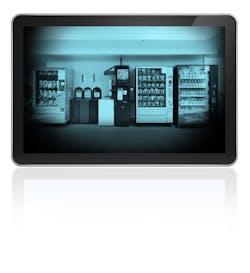It’s only a few inches of metal, but we rely on locks to keep honest people honest, and dishonest people out of our property. Vending machines are targets for thieves as they hold cash, are unattended for long periods of time and multiple machines can be opened with a single key. The Internet has compounded the problem as it allows the sale of various lock picking tools, videos on how to use them and even 3D printing Websites that offer to make real keys from photographs. However, the veteran operator knows these security issues have always existed and will continue. That doesn’t mean hope is lost. Mechanical and electronic locks are better than ever, and there are different features within each that makes them ideal for different situations. Operators can analyze their situation, their machines and even the other ways they can increase security before deciding on a lock. And if there is a specific problem, call a lock representative. They have a lot of knowledge about different options.
Mechanical locks are most popular
The biggest challenge to the security of mechanical locks is the internal mechanism inside. “If a lock’s pins have tension and counter tension, it can be picked,” said Watson Visuwan, vice president of marketing for Lock America. No matter the type of mechanical lock: plug lock, padlock, 5-pin or 7-pin tumbler or flat key lock, they can all be accessed with the proper tool or information. Tubular keys do provide protection from a picking process called “Bumping”. This method uses a key blank modified by filing each key cut to its deepest depth. The “key” is then inserted into the lock where it is hit with a hammer, which causes the pins to jump up to the lock’s shear line causing the inner cylinder to turn. Because the pins in a tubular lock are arranged in a circle, bump keying is no longer effective. While there are tools that can be purchased online to pick tubular locks, Visuwan still considers them medium security compared to the flat key locks often used for homes or offices. There are also different levels of security within tubular locks based on the material in the unit.
In a case where the lock isn’t being picked, but instead vandalized with a drill, wedge or liquid nitrogen, there are alternative ways to fight specifically against certain attacks. In the case of drilling, a solution might be an anti-drill lock made out of hardened steel called a “detainer disc” system, suggests Visuwan.
Making the right decision on which lock will work best in a particular application is most important. “With the proper knowledge and making a little more of an investment, you can have a lock with increased security that takes longer to break into, thus increasing the chances of the thief getting caught,” said Visuwan. “If the lock keeps the would-be thief there for more than 15 minutes, the lock did its job.”
Fight internal and external threats
One security option that prevents both internal and external theft is using electronic locks. Electronic locks only allow the lock to open at designated times using designated keys. The system also keeps a log of when the machine was open, and by what key, making it easier to identify issues.
“We’ve been successful at stopping key copying problems,” said Bill Denison, CEO at TriTeq Lock & Security. Properly designed electronic keys are extremely difficult or almost impossible to copy or pick.
It’s important to address internal as well as the external theft issues, said Denison. He has seen lock access records that show that there is at least communication between the route driver and the thief, even if the route driver doesn’t actually do the breaking and entering into the vending machine.
“I can see how quickly they attack one of our locks — where they drill. It’s very obvious they are talking to someone on the inside,” explained Denison. “The access records help identify what employees are aiding the thieves.”
To get the full security of an electronic lock, an operator needs more than the physical device. For instance, certain bottler-provided beverage machines include an electronic lock that opens with a low security remote controlled key. “When the machine is given to the operators, it is like a garage door opener,” said Denison. The operator needs to contact the electronic lock provider to add the extra layers of security such as higher security electronic keys and software.
However, operators might also receive a bottler machine with an electronic lock that they can utilize with programs on their computer. “[With some electronic lock systems] it is the key you program,” said Jason Faulconer, president at Locking Systems International. The operator can program the key himself or herself using a computer, limiting access to certain machines, times and even to individual personnel. Unfortunately, electronic locks are still at risk as vandals can use drills or other physical methods to break into a machine. And the damaged locks are expensive, as are lost keys. “An electronic lock can be six times that of a mechanical lock,” warns Faulconer.
Quality locks are a must
Most of the industry is using mechanical locks, versus electronic locks. However, the quality of the locks is very important. Cheap, basic tubular locks won’t provide much protection for operators. Faulconer explains that many standard, low-security tubular locks are made with zinc, dye-cast or brass — materials that are not very strong. Would-be thieves can more easily drill or break these types of locks. In addition, low-security locks have non-patented key shapes. That means key blanks are available, making it easier for a dishonest person to make a key to fit the lock.
“You can move from low-security to mid-grade,” said Faulconer. “That might mean a patented key design.” The patent restricts who can purchase key blanks for the locks, which increases the level of security. High security locks will include a patented key as well as a hardened steel face or face with a steel pin inside, adds Faulconer. The bolt that travels through the T-handle will also be made of a harder material to prevent the lock from being pulled out of the machine. Faulconer has seen this done with an automotive dent-pulling device on low-security locks.
NAMA has an established and time-tested set of standards for locks and T-handles in the U.S. “Always purchase a lock that meets NAMA specifications,” said Dale Padjen, product development-security for Highfield Manufacturing. Padjen, whose company was part of the NAMA committee years ago that helped to create the specifications for vending locks and T-handles, explains that this ensures not only a quality product but also the confidence that these products will fit all standard vending machines.
When purchasing a new route, getting new locks on vending machines should be a top priority, Padjen points out. He also recommends having a minimum number of locks per key, even if this means the route driver will have to carry several more keys. “The less number of locks per key – the less exposure to theft in the event of a breach in security from a lost or stolen key or a picking tool,” he said. Operators might also want to consider using locks with a dead bolt instead of a spring bolt. Padjen has seen route drivers close a machine door with a spring bolt, knowing it’s closed, but not realizing it isn’t locked. A dead bolt forces the driver to turn the lock, ensuring the machine is secure.
Lock-picking tools and techniques are evolving rapidly, but so too are the technologies to stop or hinder them. Operators should opt for quality locks that meet NAMA standards and then consider the problems they face. That will help them determine how many and what type of locks in which to invest.
Warehouses at risk?
A Website that makes keys from mobile phone pictures made headlines a few months ago. A sales team took photos of a colleague’s house key, sent the photos away to a 3D printer offering key reproduction services via the Internet, along with a flimsy backstory. They filmed themselves using the key they received back from the photos to enter the colleague’s house, because indeed the photos to real-thing worked. While vending machines do not commonly use flat keys, warehouses and offices might. There is also a bump key that makes it very easy to break-in to a lock. Watson Visuwan with Lock America suggests changing any flat key locks to more robust locks, either tubular or combination locks. Also, ensure the money room is secure and any cash is inside a safe.
Three different categories of vending lock crime
- Professional thieves. These criminals use picks, picking devices or machine their own keys in order to break-in to machines. They often move from state to state to avoid being caught. They will watch a route driver to discover when a machine is vulnerable and has the highest level of cash before breaking into the lock. Try to slow the thief down with uncommon locks and unpickable electronic locks.
- Vandals. This class of thief will use anything that can get them into the machine; a drill, removing the hinges, prying off the bill validator, trying to use a crowbar, etc. Use locks with hardened steel faces that are drill resistant and protect the machine in other ways with covers and protective plates.
- Internal. This is the hardest because it’s difficult for an operator to accept one of his or her employees is stealing or at least an accessory to the theft. Electronic locks can deter internal theft and make it clear the company is watching.
Non lock and key security ideas
Using more than 35 years designing and manufacturing security locks, Dale Padjen, product development-security, Highfield Manufacturing, shares ways operators can increase their security measures:
- Use a locking keyring where keys cannot be removed
- Have personnel sign out and in for keys
- Install a key lock box in vehicles for storage of keys when not in use
- Keep inventory of all keys and destroy worn keys and locks — Practice good key control and accountability
- Have employees who service machines always wear company apparel with a logo and proper identification
- Change the driver’s routes — often thieves follow a route driver learning their route, making it easier to know when to attack the machine
- Use Dynamic Scheduling (which changes the driver’s route)
Padjen also recommends operators investigate electronic locks as those systems allow the keys to work only at certain times which removes the worry of lost or stolen keys. He believes it creates a more secure and efficient locking system that can contribute to bottom-line savings.
About the Author

Emily Refermat
Emily Refermat began covering the vending industry in 2006 and served as editor of Automatic Merchandiser from 2012 to 2019. To reach the current editor of Automatic Merchandiser and VendingMarketWatch.com, email [email protected].
